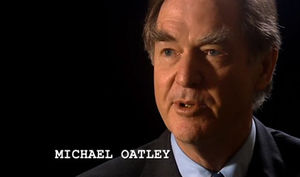Michael Oatley
(spook) | |
|---|---|
 | |
| Born | 1935 |
Michael Oatley is a MI6 officer involved in back-channel contacts with the IRA from the 1970s to the 1990s.
Contents
Career
When Steele left Northern Ireland in May 1973, his contacts were inherited by his successor, another SIS officer, Michael Oatley, "a subtle and independent-minded intelligence operative who within a few months of his arrival managed to develop connections with and around the IRA leadership to see whether it might be encouraged in the direction of political activity. Cautious probing had produced three different potential lines of contact to the IRA."[1]
The most promising, and the one he pursued, involved a Derry businessman called Brendan Duddy whom Steele had met briefly and who had helped to engineer the peaceful passage of Operation Motorman. Duddy was very much an Irish republican, but he was a pacifist and a firm believer in dialogue, which he worked single-mindedly to create. In previous accounts of the period, he has been referred to only as 'the Contact', his name a secret and his role as a brave and ingenious intermediary unpublicised for over three decades, yet he has a claim to have been among the most persistent and effective of the unsung heroes of the peace process. [2]
Ceasefire talks
According to Jonathan Powell, the Oatley-Duddy link was crucial to the negotiation of the 1975 IRA ceasefire.
Oatley's initial contacts were unknown to the Northern Ireland Secretary Merlyn Rees. Oatley informed the senior civil servant in Northern Ireland, Frank Cooper, who told the Cabinet Secretary John Hunt and the Prime Minister Harold Wilson. Oatley's interlocutors were the president of Sinn Fein, Ruairi O'Bradaigh and the IRA chief of staff Daithi O'Conaill.
At one point Duddy engineered a meeting between Oatley and IRA Army Council member Billy McKee. A series of meetings followed in which Oatley was joined by James Allan, the political advisor on Merlyn Rees' staff. A ceasefire deal was reached with the December 1974 Feakle Talks between clergyman and the IRA in Co Clare being used as a cover story. The ceasefire collapsed some months later by which time Oatley had moved onto another SIS post. Oatley maintained the contact with Duddy, in spite of an injunction from the new Northern Ireland Secretary Roy Mason forbidding any dealings with the IRA. [3]
1980 hunger strike
Duddy approached Oatley during the 1980 hunger strike. Oatley informed Ken Stowe, the Permanent Secretary at the Northern Ireland Office, who contacted Downing Street to ensure Margaret Thatcher was content. After a meeting between Oatley, Duddy, and Fr Brendan Meagher, the first IRA hunger strike was called off, although a second, more deadly strike would later take place. (Although Powell's account places these events in 1981, the first hunger strike actually ended in 1980).[4]
1991 peace feelers
In 1991, Duddy arranged a meeting between Martin McGuinness and Oatley who was retiring. McGuinness indicated that the IRA was ready for dialogue.
Oatley then had a meeting with John Chilcot, the Permanent Secretary at the Northern Ireland Office, who said he would consider how to proceed.
The head of the Security Service, Stella Rimington, was vehemently opposed to an intrusion on her turf from the Secret Intelligence Service. However, Oatley had support from the Security Service's Director and Co-ordinator of Intelligence in Northern Ireland. (This was probably John Deverell).
Eventually a retired former Secret Intelligence Service officer codenamed 'Fred' was employed by the Security Service to take over the link.
Kroll Associates
Increasing concern in the business community about industrial espionage and assorted dirty tricks will lead to a growth in the activities of private investigation companies, often using former intelligence officers.
Kroll Associates, which employs former MI6 officers, including Michael Oatley - who was in charge of the company's investigation into Saddam Hussein's secret stash of funds - sees a bright future ahead.[5]
One of the leading British companies, Control Risks, has a number of former intelligence officers as does Kroll Associates, the American firm started by James Kroll, a former associate of the late Robert Kennedy. Kroll Associates employs Michael Oatley, former head of the Middle East desk of MI6. Sir Kenneth Newman, former Metropolitan Police commissioner, works for Control Risks.[6]
Connections
- Frank Steele
- Brendan Duddy
- Martin McGuinness
- Frank Cooper
- John Hunt
- Harold Wilson
- John Chilcot
- "Fred"
References
- ↑ Talking to the enemy: the secret intermediaries who contacted the IRA, The Guardian, 18 March 2008.
- ↑ Great Hatred, Little Room: Making Peace in Northern Ireland, by Jonathan Powell, The Bodley Head, 2008, p68.
- ↑ Great Hatred, Little Room: Making Peace in Northern Ireland, by Jonathan Powell, The Bodley Head, 2008, p68-70.
- ↑ Great Hatred, Little Room: Making Peace in Northern Ireland, by Jonathan Powell, The Bodley Head, 2008, p70.
- ↑ NOW, THE SPY WHO LOOKS AT THE BOOKS; Commercial espionage has become big business. Bereft of the cold war, M16 and the CIA need new targets, by Richard Norton-Taylor, The Guardian, 8 May 1993.
- ↑ Senior appointment boosts Group 4's international work, by Christopher Elliott, Richard Ford and James Lanale, The Times, 26 May 1993.